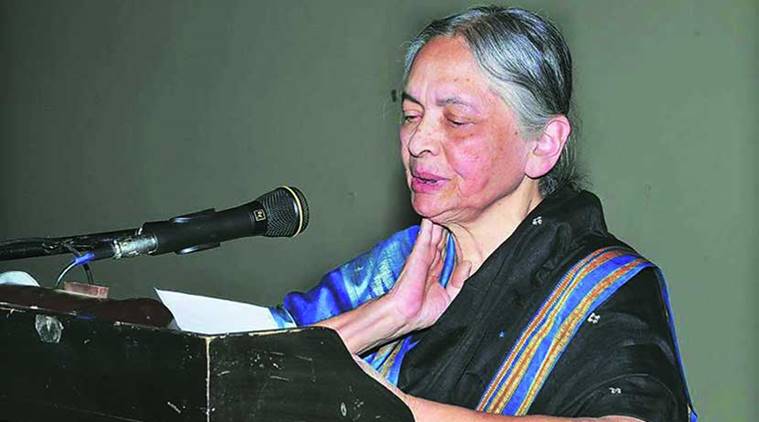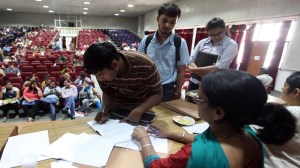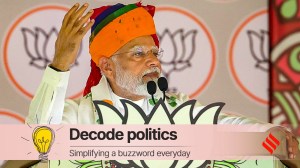- India
- International
A people’s voice
Sulabha Brahme spoke for the voiceless and underprivileged.
 Sulabha Brahme
Sulabha Brahme
With the passing away of eminent economist and Marxist activist-researcher from Pune, Sulabha Brahme, Maharashtra has lost a rebel voice. Sulabha tai, as she was fondly called, often took on the establishment single-handedly, in her writings and by involving in people’s struggles. On the eve of her death — she died on December 1, aged 84 — Sulabha tai was finalising an article on demonetisation.
Sulabha tai spent a better part of her working life — from 1959 to 1992 — as a researcher and teacher at the Gokhale Institute of Politics and Economics (GIPE), Pune, an institute of repute set up by her father, the late Dhananjayrao Gadgil, the deputy chairman of the first Planning Commission of India. At GIPE she focussed on issues like regional planning, rural development, land-use planning, irrigation, urban planning, economic development of Scheduled Castes and Scheduled Tribes, and so on. Two of her reports — Regional Development Plan for Marathwada and Land Use in Western Maharashtra — are considered pioneering and relevant even today.
She played an active role in many progressive initiatives in Maharashtra. Shankar Brahme Samaj Vignyan Granthalaya ( Brahme Granthalaya), an institution she founded in 1969 after her late husband, emerged as a intellectual centre of the Left in Maharashtra. Apart from conducting research and organising seminars and public lectures on important socio-political, cultural, environmental and developmental issues, Brahme Granthalya also published about 50 booklets in Marathi. Many of these were written by Sulabha tai with the intent to introduce critical contemporary socio-political issues — the working of multi-national corporations, drought, Enron and the Dabhol project, sustainable development of the Konkan region, diesel price rise, unemployment, GATT and new patent regimes, atomic warfare, India and Pakistan, Gujarat genocide, the plight of farmers, local languages, price rise, globalisation, Kashmir, beef ban and so on — to the masses. These were well-researched, empirically-grounded studies, providing an alternative viewpoint and demands in response to the anti-people and anti-nature policies of the government. The monographs are a testimony to her capacity to explain complex issues in ways that could be understood by common people.
She was involved in many movements and platforms, most memorably with the Marathi journal, BAIJA, that gave visibility to women’s issues in the 1970s and 80s, the Lok Vidnyan Sanghatana, working for the popularisation of science and a people-centered sustainable development, the Anti-Globalisation Samiti, the Maharashtra Drought Relief and Eradication Mandal, movements against the Enron Power Project at Dabhol and the nuclear power project at Jaitapur and Lokayat Vyaspeeth.
One of her pet projects in recent times has been to convince her friends in various movements to either embrace Buddhism in large numbers or at least become part of the Manavata Dhamma. To quote from a note on this issue, Fight against Globalisation: Countering Brahminical Religious Obscurantism by Setting up a Socio-cultural Organisation to Create a New Social Order: “To free masses from brahminical religion based on casteism, obscurantism and superstitions and lead a rational human life, chains of brahminical religion have to be broken. For social-cultural bonding and organisation, we need to strive for an alternative secular order based on the principles of liberty, equality, fraternity, social justice, dignity of labour, and harmonious relation with nature, human dignity, gender equality, and scientific temper. Such an alternative is available in the form of Buddha Dhamma formulated and embraced by Dr B.R. Ambedkar. Those who do not desire to join any established order can come together to form a new order — Manavata Dhamma. Manavata stands for the principles and values mentioned above and Dhamma means secular, social regulation for a just socio-economic order”. She believed that “the toiling masses freed from the influence of brahminical religion and united under secular Buddha and Manavata Dhamma would be in a position to fight the onslaught of globalisation effectively”. The proposal did not elicit much support from her “progressive” friends.

Though rooted in classical Marxism, Sulabha tai could engage with a much newer set of concerns — environment, caste, women’s issues, communalism and alternative development — that probably lie outside the classical Marxian framework. As Anant Phadke, her associate in the Lok Vidyan Sanghathana, said: “It is not an easy task to engage with these within the older framework and without a well-developed abstract theory; it is a difficult path and challenge, and she lived this challenge mainly because of her passion for radical social transformation.”
It is this passion that made her non-sectarian and helped her maintain close links with all shades and strands of progressive movements. It is this passion that drove her to devote all her time, material and financial resources for progressive movements.
EXPRESS OPINION
More Explained
Apr 24: Latest News
- 01
- 02
- 03
- 04
- 05









































